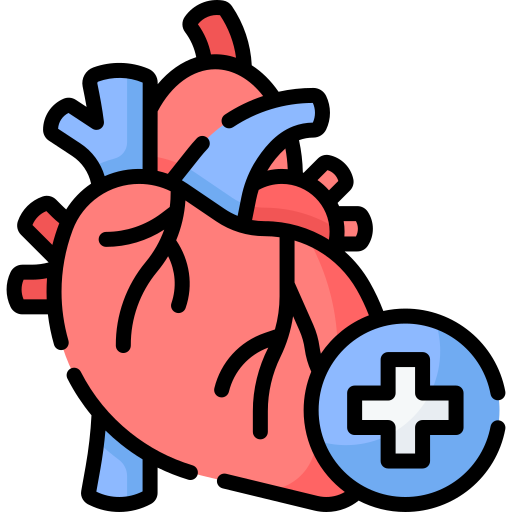
Cardiology
Cardiology encompasses the field of medicine dedicated to the study and treatment of Heart and Blood Vessel-related conditions. This expansive discipline addresses a Broad Spectrum of issues, including Congenital Heart Defects, Coronary Artery Disease, Heart Failure, Valvular Heart Disease, and Arrhythmias. Cardiologists, specialized Physicians within this Domain, Utilize a range of diagnostic tests and procedures to diagnose and treat these diseases effectively.
Heart disease is a major worldwide health problem that can result in both sickness and, unfortunately, death. It doesn't spare anyone, regardless of Lifestyle, Gender, or Age. When heart problems show up as symptoms like Breathing Problems or Chest Discomfort, they frequently require careful surgical intervention to fix problems like clogged arteries or malfunctioning valves. Even though these operations are complicated, effective medical care can lead to positive outcomes. Therefore, it is crucial to choose the right medical centre.
Sharda Care - Healthcity is a state-of-the-art super-speciality hospital that provides the best cardiac care treatment. Our hospital has advanced machines required for cardiac procedures, including Angiography, Angioplasty, and Cardiac Surgeries. Additionally, we offer round-the-clock Cardiac Emergency Services, dedicated Cardiac Wards, and specialized Cardiac Rehabilitation programs to ensure Comprehensive Care for patients with various Heart Conditions.
Book an AppointmentAt Sharda Care - Healthcity, expect unparalleled treatment encompassing a range of heart surgeries, primarily:
- Invasive Cardiology
- Non-Invasive Cardiology
- Cardiac Electrophysiology
- Stress Tests
- Heart Monitors
- CT scans
- Interventional Cardiology
Looking for an Expert
Sharda Care The Healthcity is home to some of the eminent Doctors in the world.
Book an AppointmentSub-Specialities
Adult CTVS (Cardiothoracic and Vascular Surgery)
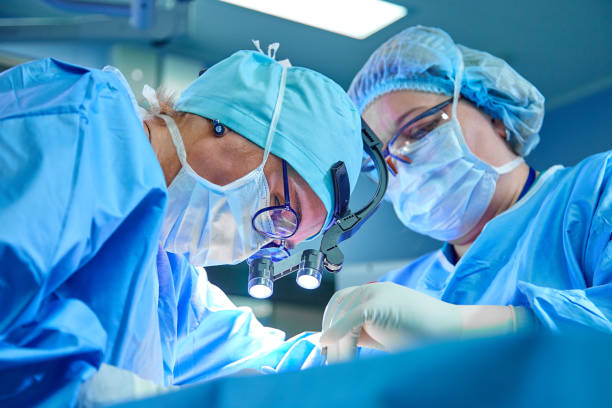
For premier Heart Surgery in India, choose Sharda Care - Healthcity . Our esteemed Cardiologists and advanced technology ensure world-class care. Renowned as a leading CTVS Surgery Hospital, we specialize in Cardiothoracic and Vascular Surgery for various Heart and Lung conditions. From Coronary Artery Bypass Grafting to Heart Transplants, our highly qualified Surgeons deliver optimal outcomes. Book an appointment online today for access to cutting-edge facilities and dedicated Cardiothoracic ICUs. Experience comprehensive post-operative care round-the-clock.
At Sharda Care - Healthcity , we specialize in CTVS, or Cardiothoracic Vascular Surgery, addressing ailments impacting the Heart, Blood Vessels, and Chest Organs. As a premier Heart Surgery Hospital in India, we provide a comprehensive array of CTVS treatments utilizing cutting-edge technology and a team of highly skilled Surgeons.
Why Sharda Care - Healthcity is your top choice for Cardio Thoracic Vascular Surgery hospital in India:
- Surgical Excellence: Our dedicated Cardiovascular and Thoracic Surgeons are proficient in managing complex Cardiothoracic Disorders, offering Tailored Care for challenging conditions.
- Advanced Technology: Sharda Care - Healthcity employs state-of-the-art technology and advanced Surgical Techniques, ensuring precision and efficacy in every procedure.
- Comprehensive Care: From Coronary Artery disease to Congenital Heart Defects, our versatility enables personalized care for a wide Spectrum of Heart and Lung conditions.
- Multidisciplinary Collaboration: Collaboration among specialities including Cardiology, Pulmonology, Anaesthesia, and Radiology ensures individualized treatment plans and optimal care.
- Patient-Centric Approach: Prioritizing patient needs, we provide Tailored Treatment plans, comprehensive pre and post-operative care, Cardiac Rehabilitation programs, and a dedicated healthcare team.
- Commitment to Innovation: Actively engaging in Research, Clinical Trials, and studies, we continuously strive for advancements in CTVS procedures, ensuring safer and improved outcomes.
Heart Surgery Solutions at Sharda Care - Healthcity
Surgical Options for Heart Surgery at Sharda Care - Healthcity :
- Aortic Surgery: The Aorta, the main Blood Vessel from the Heart, may Weaken, Bulge, or Tear, Posing Life-Threatening Risks. Our expert Surgeons specialize in Aortic Surgery, utilizing cutting-edge techniques to repair or replace the damaged segment, restoring normal Blood flow and enhancing heart health.
- Aortic Valve Surgery: Damage to the Aortic Valve can hinder proper Blood Flow, impacting Heart function. Our hospital offers various minimally invasive options for Aortic Valve Surgery, including Endoscopic and Non-Sternotomy procedures, ensuring improved Heart function and reduced post-operative discomfort.
- Arrhythmia Surgery: Arrhythmia disrupts the Heart's Rhythm, affecting Blood circulation. Our specialists employ advanced techniques such as Catheter Ablation and Pacemaker Implantation to correct abnormal Heart Rhythms, promoting optimal Blood circulation and reducing the risk of adverse Cardiac events.
- Corrective Surgery for Genetic Heart Defects: Genetic Heart defects present from Birth can impair Heart function. Our dedicated team of Paediatric Cardiologists and Surgeons offer customized corrective procedures, aiming to improve heart performance and long-term outcomes for patients.
- Heart Failure Surgery: When your Heart is unable to pump enough Blood to meet your Body’s demands, it can lead to Heart Failure. This condition manifests through symptoms like shortness of Breath, Swelling, and Fatigue, posing risks to your organs and overall survival. Heart Failure Surgery aims to improve your heart's functionality and alleviate these symptoms.
- Left Ventricular Assist Device (LVAD): The LVAD is a mechanical device designed to support the Pumping Action of your Left Ventricle, the Heart's primary Pumping Chamber. By facilitating sufficient Blood delivery to your body and providing support to Vital Organs, LVAD serves as a lifeline for individuals experiencing advanced Heart Failure.
- Left Ventricular Remodelling/Surgical Ventricular Restoration: After a Heart attack, this technique focuses on reshaping the Left Ventricle, removing scarred or damaged tissue to restore a more natural size and shape. This process enhances Pumping efficiency, thereby reducing the workload on the heart.
- Heart Transplantation: For individuals with end-stage Heart Failure unresponsive to other treatments, Heart Transplantation offers a new lease on life. This surgical procedure involves replacing the failing heart with a healthy one from a donor, offering hope for improved quality of life and longevity.
- Awake Heart Surgeries: These innovative procedures, performed either on or off-pump under High Thoracic Epidural Anaesthesia, allow patients to remain awake while undergoing surgery. Particularly beneficial for individuals unable to tolerate general Anaesthesia, awake Heart Surgeries mitigate associated risks and complications, ensuring safer outcomes.
- Cardiothoracic and Vascular Procedures: These surgical interventions target conditions affecting the Heart, Lungs, and Blood Vessels, addressing diverse Cardiovascular Ailments, including:
- Bypass Surgery (Off-Pump and Keyhole): These techniques establish alternative Blood Pathways to Bypass obstructed Arteries in the heart or elsewhere in the body. While off-pump Surgery avoids the use of a Heart-Lung machine, Keyhole Surgery employs small incisions and a Camera, Minimizing Trauma and expediting recovery.
- Major Aortic Cardiac Aneurysm Surgeries: Vital for addressing Aortic Aneurysms—Abnormal Bulges or Weak Spots in the body's largest Artery—these procedures are essential to prevent potentially Life-Threatening ruptures. Surgeon’s repair or replace the affected portion of the Aorta with synthetic Grafts or Stents.
- Minimal Access Aortic Arch Replacement: A less invasive approach to replacing the Aortic Arch—the curved segment of the Aorta supplying Blood to the Head and Arms—this method involves a small Chest incision and specialized device insertion for Graft placement. It reduces Surgical impact and shortens recovery time.
- Aortic Surgery (Hybrid and Endovascular Aortic Surgery): These innovative strategies tackle Aortic Ailments like Aneurysms, Dissections, or Ulcers, Blending Open and Minimally Invasive techniques. Hybrid surgery combines Surgical and Endovascular approaches, while Endovascular Surgery employs Catheters and stents for internal Aorta repair, offering tailored treatment solutions.
Coronary Artery Bypass Graft Surgery (CABG)
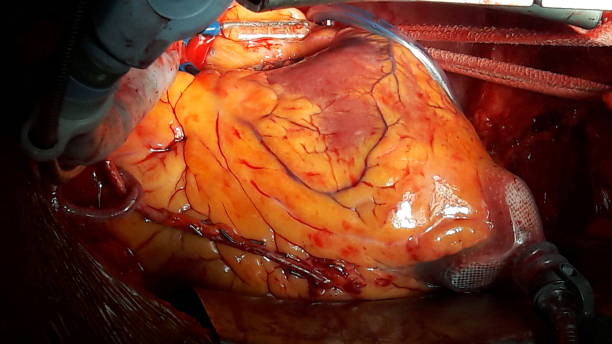
Coronary Artery Bypass Graft Surgery (CABG) is a Surgical Intervention aimed at addressing Coronary Artery Disease (CAD), which involves the narrowing of the Coronary Arteries. These Arteries are responsible for supplying the Heart Muscle with Oxygen and Vital Nutrients. CAD develops due to the accumulation of fatty deposits within the Artery Walls, leading to a reduction in Blood Flow and Oxygen Delivery to the Heart Muscle.
When Is Coronary Artery Bypass Surgery Necessary?
Coronary Artery Bypass Graft Surgery (CABG) becomes necessary when one or more of your Coronary Arteries are blocked or narrowed, hindering the Blood Flow to your Heart Muscle. This procedure aims to restore proper Blood circulation to your Heart when other non-surgical treatments are not feasible.
Symptoms of Coronary Artery Disease (CAD) can vary and may include:
- Chest Pain
- Fatigue (severe tiredness)
- Palpitations
- Abnormal Heart Rhythms
- Shortness of Breath
- Swelling in the Hands and Feet
- Indigestion
In the early stages of CAD, you may not experience any symptoms. However, the disease will progress over time, leading to symptoms and potential complications. If the blockage in your Coronary Artery Worsens, it can result in a Heart Attack. Without prompt intervention to restore Blood Flow to the affected part of the Heart Muscle, Tissue Damage and Death may occur.
Interventional Cardiology
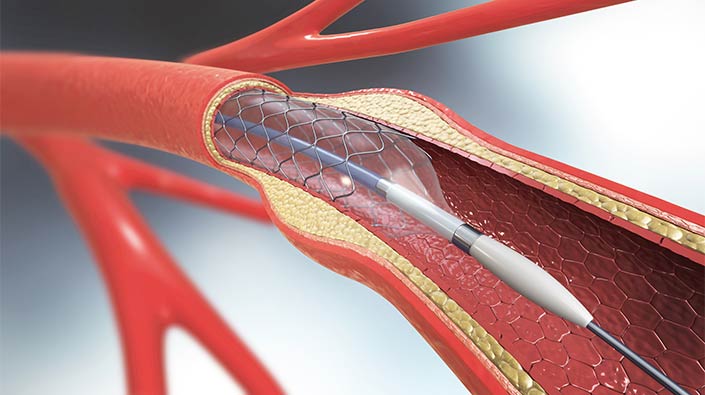
Interventional Cardiology offers a Minimally Invasive approach to diagnosing and treating Heart and Blood Vessel diseases through Catheter-based techniques. These procedures avoid the need for open Surgery or Large Incisions, utilizing Thin Tubes called Catheters inserted through a small Skin puncture. Guided by X-ray or Ultrasound imaging, these Catheters reach the affected area. This approach provides patients with benefits like Quicker Recovery, Reduced Pain, Lower Infection Risk, and Shorter hospital stays. At Sharda Care - Healthcity , our skilled Interventional Cardiologists employ cutting-edge Techniques to ensure optimal outcomes for every patient.
Interventional Cardiology effectively addresses various Heart conditions, including:
- Coronary Artery Disease (CAD): Occurs when Arteries carrying Blood to the Heart Muscle narrow or become blocked, leading to symptoms like Chest Pain or Cardiac Attacks.
- Valvular Heart Disease: Involves Dysfunction of Heart Valves, disrupting Blood Flow between Heart Chambers and causing symptoms such as Fatigue, Swelling, or Heart Failure.
- Structural Heart Disease: Characterized by Abnormalities in the Heart's shape or function, either congenital or acquired. Examples include Atrial Septal Defect (ASD), Ventricular Septal Defect (VSD), Patent Foramen Ovale (PFO), or Hypertrophic Cardiomyopathy (HCM).
At Sharda Care - Healthcity , we offer a range of advanced procedures in Interventional Cardiology to address various Heart conditions:
- Coronary Angiography: Utilizing special Dye and X-rays, this test visualizes Heart Arteries to detect Blockages or Narrowing.
- Coronary Angioplasty and Stenting: A procedure using a Balloon and Stent to open blocked Arteries and restore Blood Flow.
- Coronary Atherectomy and Rotablation: Employing a device to remove plaque causing Artery Blockages.
- Balloon Valvuloplasty: Widening narrowed or stiff Heart Valves to improve function.
- Transcatheter Aortic Valve Replacement (TAVR): Implanting an Artificial Valve via a Catheter without removing the Old Valve.
- Transcatheter Mitral Valve Repair (TMVR): Clipping or Stitching Mitral Valve leaflets to reduce Blood Leakage.
- Device closure of ASD, VSD, PFO: Placing a device via Catheter to seal Heart Chamber Holes, preventing Blood mixing.
- Alcohol Septal Ablation: Injecting Alcohol into a Coronary Artery branch to shrink thickened Heart Muscle and Relieve Obstruction.
- Left Atrial Appendage Closure (LAAC): Placing a device via Catheter to Block the Left Atrial Appendage, reduces Stroke risk.
Non - Invasive Cardiology
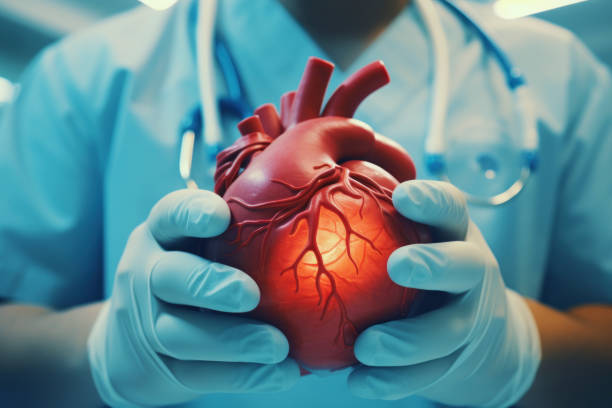
At Sharda Care - Healthcity , our dedicated team of specialists in non-invasive cardiology employs cutting-edge techniques to provide exceptional cardiovascular care without resorting to invasive procedures. Whether you require non-invasive cardiac output monitoring or precise cardiac imaging, our comprehensive services cater to your individual needs. Through various imaging techniques, diagnostic tests, and state-of-the-art technologies, our non-invasive cardiologists can accurately assess heart structure and function, detect abnormalities, and devise effective treatment strategies to manage cardiovascular conditions efficiently.
Methods Employed in Non-Invasive Cardiology
Non-invasive cardiologists utilize a variety of techniques, including:
- Echocardiography: Also referred to as cardiac ultrasound, this non-invasive imaging method utilizes sound waves to generate images of the heart, aiding in the assessment of its function and detection of any abnormalities.
- Nuclear Cardiology: This non-invasive diagnostic approach involves the use of various imaging modalities utilizing radioactive elements to assess cardiovascular conditions.
- Stress Testing: This procedure involves monitoring the heart's activity during physical exertion, such as walking on a treadmill or cycling on a stationary bike, to evaluate its stress response.
- Cardiac Magnetic Resonance Imaging (MRI): Utilizing powerful magnets and radio waves, this imaging technique produces detailed images of the heart, facilitating the diagnosis of cardiac abnormalities.
- Electrocardiography (ECG or EKG): This method utilizes heart monitors to record the heart's electrical activity, aiding in the diagnosis of various cardiac conditions.
- Computed Tomography (CT) Angiography: Using X-rays, this imaging procedure visualizes blood vessels to detect blockages or narrowing, providing insights into the extent of coronary artery disease without the need for invasive interventions like cardiac catheterization.
- Non-Invasive Cardiology in Practice
- Non-invasive cardiology serves as a cornerstone in the diagnosis, management, and prevention of various cardiovascular ailments. Its pivotal applications encompass:
- Diagnosis of Cardiovascular Conditions: Non-invasive imaging modalities like echocardiography, cardiac MRI, and CT angiography aid in identifying coronary artery disease, heart valve disorders, myocardial damage, cardiomyopathies, and congenital heart anomalies.
- Assessment of Cardiac Function: These techniques enable the evaluation of cardiac pumping ability, assessment of valve function, and detection of structural abnormalities and blood flow irregularities within the heart.
- Risk Evaluation: Non-invasive stress tests and arterial calcium scores can help figure out how likely someone is to get heart disease and help with the prevention and treatment of that disease.
- Monitoring: Non-invasive cardiology encompasses the surveillance of treatment efficacy, including medication regimens, lifestyle modifications, and cardiac rehabilitation initiatives, to optimize cardiac health and function.
Benefits of Non-invasive Cardiology
Non-invasive cardiology presents several advantages over invasive techniques, making it the preferred approach for diagnosing and managing various cardiac conditions. Some of its key benefits include:
- Safety: Unlike invasive procedures, non-invasive techniques do not require the insertion of catheters or surgical tools into the body, reducing the risk of infection, bleeding, or damage to blood vessels and organs.
- Comfort: Non-invasive tests involve minimal discomfort compared to invasive procedures, often eliminating the need for sedation or anaesthesia.
- Accessibility: Non-invasive tests are readily available and can be performed in outpatient settings, minimizing the need for hospitalization and allowing for greater convenience for patients.
- Cost-Effectiveness: Non-invasive procedures are generally more affordable than invasive techniques, as they do not necessitate specialized equipment or operating rooms.
- Versatility: Non-invasive tests can assess a wide range of cardiac conditions and can be repeated as needed to monitor changes in a patient's condition over time.
- Early Detection and Prevention: Non-invasive tests enable early detection of cardiac issues, facilitating timely intervention and preventive measures to mitigate the risk of cardiovascular diseases.
- Convenience: With shorter preparation and recovery times than invasive procedures, non-invasive tests allow patients to resume their normal activities sooner, enhancing overall convenience and patient satisfaction.
Paediatric CTVS (Cardiothoracic and Vascular Surgery)
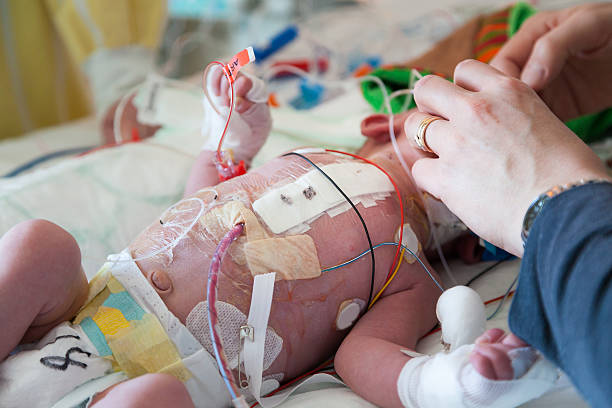
At Sharda Care - Healthcity , we have dedicated facilities for Paediatric and Congenital Cardiac Care, where we embark on a journey to transform lives through cutting-edge surgeries and procedures. Our Spectrum of Patients Ranges from Foetuses (Fetal Cardiology) to individuals of any Age with congenital structural Heart Disease. Our promise is to give complete, caring care to kids with Heart Diseases that they were born with or that they got later in life so that every little heart has a better, healthier future.
Our Expertise:
We bring together a multidisciplinary team of highly skilled Paediatric Cardiologists, Cardiac Surgeons, Nurses, and support staff. Our team is dedicated to providing the best care and treatment to Children facing Cardiac problems. With commitment and excellence, our institution is at the forefront of Paediatric Cardiac Sciences.
Surgeries and Procedures:
Non-Invasive:
- Echocardiography and Cardiac investigations including CT & MRI
- Evaluation of Heart Murmurs
- Diagnosis and management of Congenital Heart Defects
Congenital Heart Defect Repair:
- Tetralogy of Fallot Correction
- Septal Defect Closure such as VSD, ASD, etc.
- Aortic Valve Repair/Replacement
- Arterial Switch Operation
- Pulmonary Valve Repair/Replacement
- Fontan Operation / Glenn Surgery
- Conduit-based procedures
Catheter-Based Interventions:
- Pulmonary & Aortic Valvuloplasty
- Balloon Dilatation of Coarctation
- Balloon Angioplasty
- Device Closure of ASD, VSD, PDA, AV Canal, PA Stent
- Balloon Atrial Septostomy
- Total Anomalous Pulmonary Venous Connection (TAPVC) Repair
Vascular Surgery
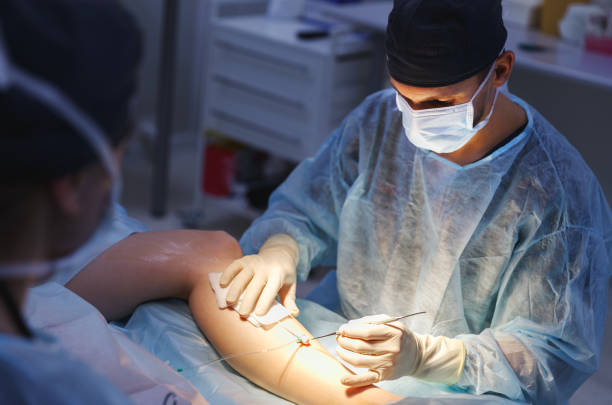
Vascular surgery, an essential speciality in healthcare, focuses on the intricate network of blood vessels throughout the body. This system, comprising arteries, veins, and lymphatic circulation, plays a crucial role in overall well-being. At Sharda Care - Healthcity , our vascular surgeons meticulously diagnose and treat diseases affecting these pathways, excluding those of the heart and brain. Using a range of interventions from medication to minimally invasive procedures and surgical reconstructions, they ensure the proper functioning of these vital conduits.
Common Conditions Addressed by Vascular Surgery
The prevalence of vascular diseases, encompassing disorders affecting blood vessels and circulation, has seen a notable rise in India over recent years. Some of these conditions include:
Carotid Artery Disease:
Carotid artery disease manifests as the narrowing or blockage of the neck arteries supplying blood to the brain. Often originating from the buildup of fatty plaques, severe cases with a high stroke risk may necessitate vascular surgery for optimal management and prevention.
Deep Vein Thrombosis (DVT):
Deep vein thrombosis refers to the formation of clots within deep veins, posing the risk of dislodgment towards the lungs, potentially resulting in a life-threatening event. When medications alone prove insufficient to restore healthy circulation, procedures performed by vascular surgeons offer a crucial solution for effective management and patient safety.
Atherosclerosis:
Atherosclerosis arises from the accumulation of fats and cholesterol in artery walls, leading to blockages. In severe cases, vascular surgery becomes necessary to restore blood flow and reduce the risk of serious cardiovascular events.
Varicose Veins:
Varicose veins, characterized by dilated and enlarged veins, primarily affect the lower extremities, causing discomfort and cosmetic concerns. In cases of treatment-resistant symptoms, vascular surgery effectively resolves the condition by addressing underlying venous insufficiency.
Causes of Vascular Diseases
- Atherosclerosis: Plaque buildup in the arteries narrows and restricts blood flow.
- Hypertension: Prolonged elevated blood pressure can damage blood vessels.
- Diabetes: Increases the risk of atherosclerosis and damages small blood vessels.
- Smoking: Damages blood vessel walls and increases the risk of atherosclerosis.
- Obesity: Excessive weight strains the heart and blood vessels.
- High Cholesterol: Elevated cholesterol levels lead to plaque buildup in arteries.
- Family History: Genetic predisposition can increase the risk of vascular diseases.
- Sedentary Lifestyle: Lack of physical activity contributes to poor circulation and vascular issues.
- Age: Natural wear and tear on blood vessels increases the risk of vascular diseases.
- Poor Diet: High consumption of unhealthy fats, sugars, and processed foods contributes to vascular problems.
Preventive Measures for Vascular Diseases
Before considering surgery, our consultants prioritize guiding patients toward risk factor modification to prevent disease progression or recurrence. Recommendations may include:
- Smoking Cessation: Encouraging and supporting efforts to quit smoking, a significant contributor to vascular disease.
- Diabetes Management: Providing guidance and resources for managing diabetes effectively to mitigate its impact on vascular health.
- Healthy Dietary Modifications: Advising on dietary changes to promote heart health and reduce the risk of vascular diseases.
- Appropriate Footwear: Recommending footwear that not only prevents but also addresses any existing vascular issues, promoting overall foot health.






